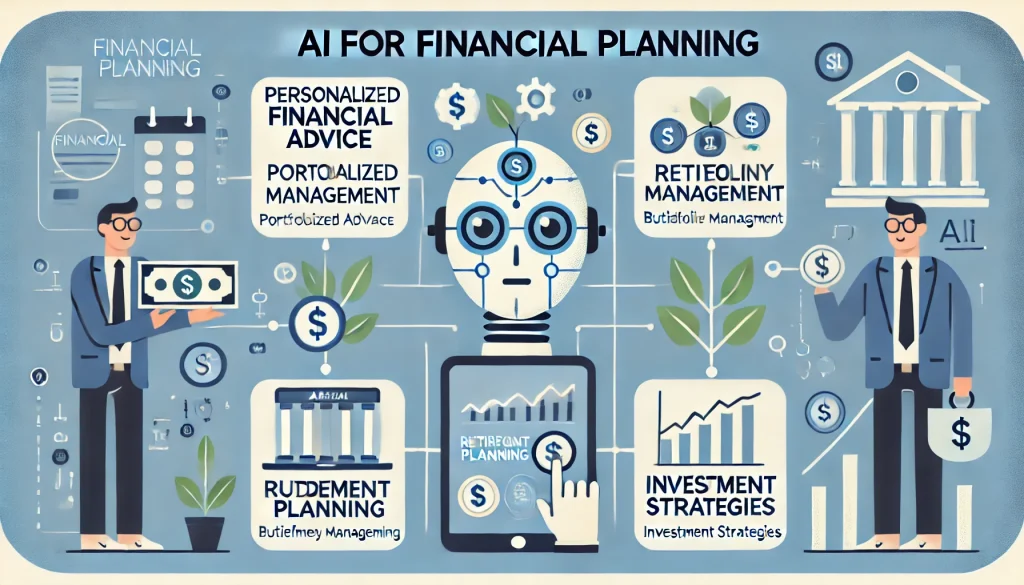Artificial Intelligence (AI) has taken numerous industries by storm, and the finance sector is no exception. AI’s emergence has brought significant advancements in financial planning and investment, transforming traditional practices and creating new opportunities for businesses and individuals alike. This article dives into AI’s role in financial planning, examining its growth, impact, and future implications for the finance industry.
Understanding AI in Financial Planning
AI, in simple terms, refers to machine intelligence designed to replicate human actions, such as analyzing data and predicting outcomes. In the world of financial planning, AI algorithms can process massive datasets, find patterns, and use historical data to make highly accurate predictions. This capability enables financial planners to provide clients with data-driven recommendations tailored to their financial goals, risk tolerance, and investment preferences.
The Growing Influence of AI in Finance
AI’s role in finance has accelerated due to its ability to handle complex tasks with precision. Through advanced machine learning techniques, AI helps financial institutions streamline processes, mitigate risks, and enhance decision-making. AI has found applications in fraud detection, credit scoring, trading, and portfolio management, ultimately improving efficiency and cost-effectiveness.
Key Contributions of AI to Finance
- Automating Manual Processes: Reduces time spent on routine tasks.
- Risk Assessment: Predicts potential risks by analyzing customer behavior.
- Enhanced Decision-Making: Assists in portfolio management by spotting profitable opportunities.
- Cost Savings: Lowers operational costs and improves accuracy.
AI Technology Transforming Financial Planning
The integration of AI technology in financial planning has revolutionized wealth management. AI-driven automated systems can analyze client profiles, identify their risk preferences, and assess investment goals. With this data, these systems create personalized portfolios designed to optimize performance, minimizing the need for constant human intervention.
Benefits of AI-Driven Financial Planning
- Customized Portfolio Management: Matches investments with individual needs.
- Real-Time Market Monitoring: Adjusts asset allocations based on trends.
- Minimizes Human Error: Data-driven insights reduce emotional decision-making.
Enhancing Wealth Management with AI
AI’s ability to generate real-time recommendations has transformed wealth management. By analyzing market movements and potential investment opportunities, AI tools allow individuals to make informed decisions faster. AI-driven chatbots have also streamlined customer service, providing instant financial guidance and improving client satisfaction.
AI Applications in Wealth Management
- Market Analysis: Forecasts and advises on trends.
- Customized Client Interactions: Chatbots offer tailored support.
- Instant Financial Advice: Assists clients with quick financial insights.
Improving Personal Finance with AI
AI’s impact is not limited to large-scale finance; it also assists individuals with personal finance management. AI-powered tools can analyze users’ spending habits, categorize expenses, and suggest saving strategies, all while automating routine tasks like bill payments and subscription tracking.
AI Tools for Personal Finance
- Budgeting Apps: Track spending habits.
- Smart Assistants: Automate payments and suggest budget-friendly changes.
- Money-Saving Insights: Analyze transactions to identify saving opportunities.
Benefits of AI in Financial Planning
AI offers an array of benefits in financial planning, from faster processing times to improved decision-making. The automation of repetitive tasks allows financial planners to focus on strategy, freeing up time to build relationships with clients. Additionally, AI reduces human error, providing an objective approach to investment planning.
Looking Ahead: The Future of AI in Finance
AI’s role in finance is set to expand, with advancements in big data, machine learning, and blockchain technology. These innovations will likely lead to more sophisticated AI-driven financial systems, offering improved risk management and predictive analytics. However, a balance between human expertise and AI will remain crucial for effective financial planning.
Frequently Asked Questions
1. How does AI enhance financial planning?
AI analyzes large datasets, identifies patterns, and assists in making data-driven investment decisions.
2. What is the future of AI in finance?
AI is expected to grow with technological advancements, enhancing predictive analysis, risk management, and efficiency in financial processes.
3. Can AI help with personal budgeting?
Yes, AI tools can analyze expenses, track budgets, and suggest saving strategies for personal finance management.



